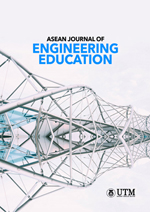A Review of SoTL Research Methodologies: A Guide to Conceptualizing and Conducting the Scholarship of Teaching and Learning
DOI:
https://doi.org/10.11113/ajee2025.9n1.192Keywords:
scholarship of teaching and learning, innovation, assessment, educational research, teaching practicesAbstract
Research Methodologies: A Guide to Conceptualizing and Conducting the Scholarship of Teaching and Learning is a comprehensive and practical guide for educators, researchers, and graduate students engaged in the Scholarship of Teaching and Learning (SoTL), with relevance to those in engineering education. Authored by Michelle Yeo, Janice Miller-Young, and Karen Manarin, the book provides a structured approach to conceptualizing, conducting, and disseminating SoTL research. With a focus on both theoretical frameworks and practical applications, this resource addresses diverse research paradigms, from positivist and interpretive to transformative methodologies. It highlights a range of data generation methods, including quantitative surveys, qualitative interviews, focus groups, and artifacts, ensuring a balanced approach for both the theoretical and practical aspects of SoTL. The authors emphasize the importance of research-based assessment and innovation in teaching practices, offering guidance on research design and analysis that directly relate to improving educational outcomes in engineering programs. Ethical considerations are woven throughout the text, ensuring that SoTL research in engineering education maintains a focus on social justice and inclusivity. With sections dedicated to theoretical frameworks, data generation, and the dissemination of research, this book provides the essential tools for advancing both theoretical understanding and innovative practices in engineering education. It serves as a vital resource for those seeking to enhance their teaching through research and contribute to the development of engineering education through evidence-based innovation and assessment. Hence, this book review evaluates the book’s key themes on methodological approach, theoretical foundations as well as implications for STEM Educators.



















